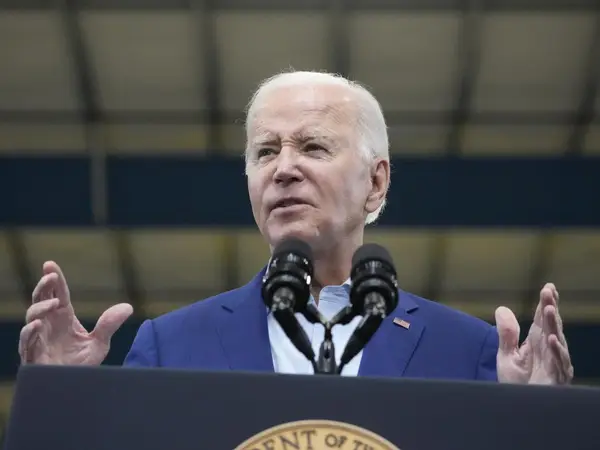While the US continues to avoid blaming Iran for the Hamas invasion of Israel, President Joe Biden acknowledged the regime’s support for its proxy on Sunday.
And as tensions rise on Israel’s northern border with Lebanon, Iran-backed Hezbollah was more active on Sunday than on any day since the war broke out on October 7, Biden told 60 Minutes: “Hezbollah is a powerful Islamist militia to Israel's north which is armed and trained by Iran. Iran also supports Hamas.”
The unequivocal link to Iran of the recent invasion and atrocities which have left at least 1,400, mostly civilians, butchered after a shock invasion of Hamas special forces, reinforces the fears of the regime’s continued destabilization of the situation.
After multiple attacks from Hezbollah on Sunday, Israel's Ministry of Defense and Israeli Defence Forces announced that residents who live within two kilometers of the border with Lebanon are now being evacuated and offered state-funded accommodation. The move will effect 28 Israeli towns and villages.
Asked for his message to Iran amidst the rising concerns about Tehran possibly getting involved in the war, Biden said simply, “Don't. Don't, don't, don’t,” in a message of deterrence. He reiterated the previous statements from the government that there is “no clear evidence” of Iran’s direct involvement in the Hamas operation, which broke out on October 7, the deadliest single day for Jews since the Holocaust.
Speaking on the hour-long documentary, he said: “Now, Iran constantly supports Hamas and Hezbollah …. [but] did they have foreknowledge, did they help plan the attack, there’s no evidence of that at this point.”
However, the fears of escalation have already seen the US send a powerful naval battle group into the Mediterranean and a pledge to do whatever it takes to support Israel in its battle against Hamas.
Monday morning saw the possible reopening of the Rafah Crossing from Gaza to Egypt to allow the passage of aid and the exit of foreign passport holders, though Israel’s Prime Minister’s office asserted in a press statement there was “no ceasefire”.
On his regional tour, US Secretary of State Antony Blinken and other international diplomats have been working to secure the opening in a bid to retain calm.
Overnight, six top leaders of Hamas’ military and political arms were assassinated, including those directly responsible for the implementation of Operation Al Aqsa Flood, the name given to the invasion on October 7, later declared a war by the terror group, Hamas.
Authorities in Gaza said at least 2,750 people had so far been killed by the Israeli strikes, a quarter of them children, and nearly 10,000 wounded. Another 1,000 people were missing and believed to be under rubble.
The US has told its citizens in Gaza to get close to the crossing so they can move out, estimating the number of dual-citizen Palestinian-Americans in Gaza at 500 to 600 among the enclave's population of 2.3 million.
Several world leaders are intervening to bring calm, and eyes continue to look to Iran as the backer of its proxies surrounding Israel, including in Syria and the West Bank. French President Emmanuel Macron warned President Ebrahim Raisi against any escalation of the conflict in phone call on Sunday.
”The president of the republic warned President Raisi against any escalation or extension of the conflict, especially to Lebanon," Macron's office said in a statement. "Given its relations with Hezbollah and Hamas, Iran has a responsibility in this respect. Iran must do everything possible to avoid a regional flare-up," it added.
In the US, Senators are also calling for action to weaken the chances of escalation. Senato Lindsey Graham (R-S.C.) warned Iran that should there be escalation on Israel’s northern border, the regime would face consequences.
Speaking in an interview on NBC’s Meet The Press, he vowed to introduce a resolution in the Senate to allow “military action by the United States in conjunction with Israel to knock Iran out of the oil business,” he said.
In a harsh warning, he said: “Iran, if you escalate this war, we’re coming for you.” While official lines from the US government have avoided blaming Iran for the war, he said it was “laughable” to say the regime was not responsible for the October 7 invasion given the historic backing given to the proxy group.
